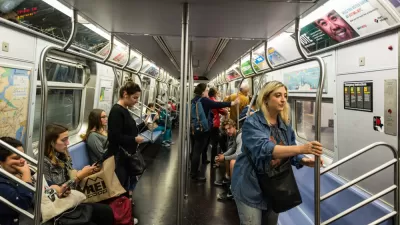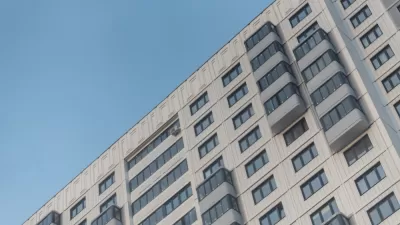Unlike its slowing economy, infrastructure projects across China continue to expand. Already home to three of the world's most-used transit systems, China plans to invest $127 billion in the coming decade to build dozens of new urban rail projects.
The Transport Politic's Yonah Freemark looks at the dramatic expansion of China's urban rapid-transit networks. Three Chinese cities now occupy the 4th, 5th, and 6th places for highest transit usage in the world (Guangzhou, Shanghai, and Beijing, respectively). In total, "[a]bout $127 billion (or 800 billion yuan) is to be directed over the next three to eight years to build 25 subways and elevated rail lines as a stimulus whose major benefit will be a increase in mobility for the rapidly urbanizing nation," says Freemark.
The Chinese government doesn't seem to be concerned with whether the new lines will ever be able to pay back their initial capital expenses or become operationally independent. Freemark opines on why this might be the case:
"It seems more likely that Chinese officials recognize that the metro investments, in addition to offering an important economic stimulus, provide positive externalities that outweigh the subsidies that will be required to maintain the systems. By setting fares low, the metro lines are able to attract higher ridership and passengers from across the income spectrum. Even in the densest, most-packed city centers, metro systems allow largely congestion-free mobility that is able to handle far more people and provide faster service than equivalent tramway or BRT programs."
"There is a reason these projects have proven so popular among China's citizens. The transportation benefits they offer certainly contribute to economic growth in the center of the cities they serve and likely limit the suburbanization of jobs."
Thanks to Andrew Gorden
FULL STORY: Profitable or Not, China Doubles Down on Investments in New Metro Systems

Alabama: Trump Terminates Settlements for Black Communities Harmed By Raw Sewage
Trump deemed the landmark civil rights agreement “illegal DEI and environmental justice policy.”

Study: Maui’s Plan to Convert Vacation Rentals to Long-Term Housing Could Cause Nearly $1 Billion Economic Loss
The plan would reduce visitor accommodation by 25% resulting in 1,900 jobs lost.

Planetizen Federal Action Tracker
A weekly monitor of how Trump’s orders and actions are impacting planners and planning in America.

This Toronto Suburb Has More Bus Riders Than Columbus, Ohio
Brampton, Ontario used gradual improvements in service to prove that if you build it, they will ride.

Paris Bike Boom Leads to Steep Drop in Air Pollution
The French city’s air quality has improved dramatically in the past 20 years, coinciding with a growth in cycling.

Why Housing Costs More to Build in California Than in Texas
Hard costs like labor and materials combined with ‘soft’ costs such as permitting make building in the San Francisco Bay Area almost three times as costly as in Texas cities.
Urban Design for Planners 1: Software Tools
This six-course series explores essential urban design concepts using open source software and equips planners with the tools they need to participate fully in the urban design process.
Planning for Universal Design
Learn the tools for implementing Universal Design in planning regulations.
Smith Gee Studio
Alamo Area Metropolitan Planning Organization
City of Santa Clarita
Institute for Housing and Urban Development Studies (IHS)
City of Grandview
Harvard GSD Executive Education
Toledo-Lucas County Plan Commissions
Salt Lake City
NYU Wagner Graduate School of Public Service




























